The Russia VPN Ban: What You Need to Know in 2025
President Putin signed a bill outlawing the use of certain VPNs in 2017, and it has since been used as the launchpad for the Russia VPN ban. Providers have had a rough time in Russia, with 14 services getting banned in 2021 alone. Read on to get the nitty-gritty details of the VPN ban in Russia.
Russia isn’t a place friendly to human rights. The Putin government is synonymous with a despotic regime renowned for censoring the opposition and keeping journalists from doing their jobs. Besides that, the government has been intensifying efforts to tighten its grip on internet control, and the ongoing Russia VPN ban is the tip of the iceberg.
Virtual private networks (VPNs) and anonymizers have always threatened to sabotage the Russian authorities’ attempts to control access to information. This is because VPNs use traffic masking techniques to help Russian citizens bypass internet censorship. Roskomnadzor — Russia’s communications regulator — has been imposing the VPN ban in multiple waves.
Key Takeaways:
- The Russian VPN ban is only going to get worse as years go by due to Roskomnadzor’s unrelenting desire to gain a stranglehold on access to information in Russia.
- Russia claims to ban VPNs because they aid access to banned sites and platforms. Of course they do, but that’s a mere smoke screen to conceal the government’s deep-rooted desires to control the internet in Russia.
- VPN vendors have to get approval from the authorities to operate within the Russian borders. Usually, this means the provider has to comply with Russia’s censorship demands, like connecting to the FSIS.
In this article, we’ll recount the Russia VPN ban, from March 2019 when Roskomnadzor sent emails to several leading VPN providers to the December 2021 events which saw various services including NordVPN — our choice for the best VPN — being banned. Keep reading to learn about all the VPN services banned in Russia.
In 2022 Russia blocked access to most VPN websites, and in 2024 it began ordering Apple to delist several VPNs from its app store, including NordVPN and Proton VPN. It is crucial to install your chosen VPN before entering Russia.
-
01/31/2022 Facts checked
We have updated this article to include all the VPN bans the Russian government imposed in 2021. We also added an up-to-date list of all VPNs banned in Russia.
The Russia VPN Ban: Then & Now
The Russian government has been dropping the hammer on VPN services for years now. Things started going south for VPNs in 2017 when president Putin signed into law a bill banning the use of VPNs, the Tor network and proxies to access blocked content without government approval.
At the time, Leonid Levin — head of the information policy committee in the lower house of parliament (Duma) — claimed the law was only meant to prevent Russian citizens from accessing “unlawful content.” However, it oversteps the mark and since it came into effect in November 2017, it has triggered a cascade of VPN bans geared toward stifling the free flow of information.
Here’s the Russia VPN ban in a nutshell:
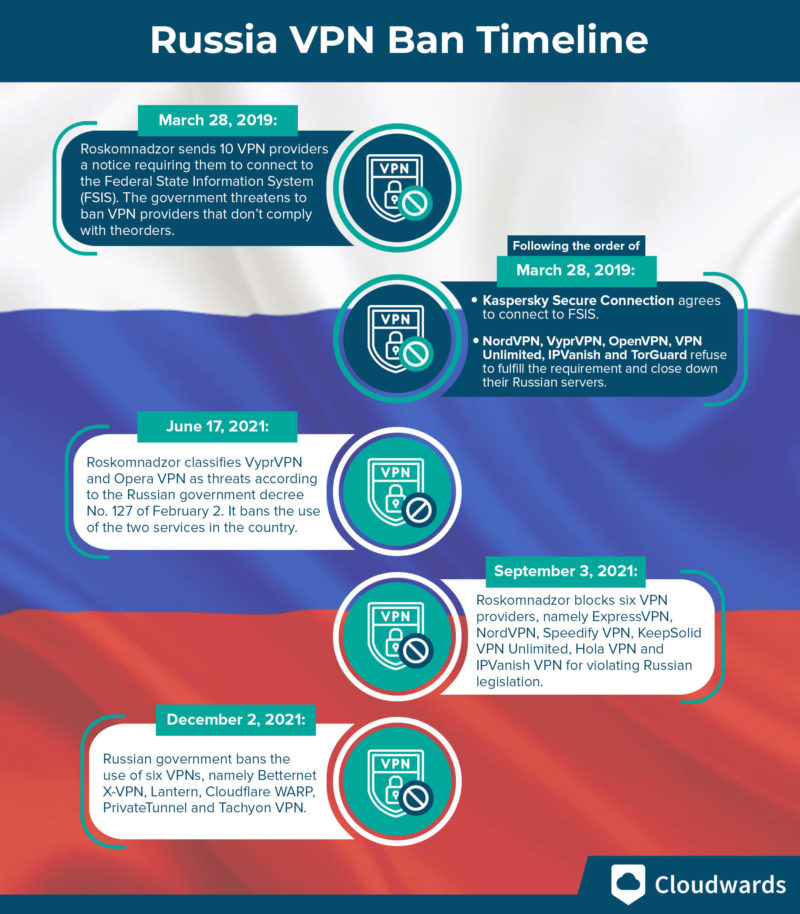
Since 2019, Russia has banned a total of 15 VPN services. Here’s the updated list of the banned VPN services:
- ExpressVPN
- NordVPN
- VyprVPN
- IPVanish
- Hola VPN
- ProtonVPN
- Opera VPN
- KeepSolid VPN Unlimited
- Speedify VPN
- Betternet
- X-VPN
- Lantern
- PrivateTunnel
- Cloudflare WARP
- Tachyon VPN
How did all these VPN services end up on the Russian government unwanted list? To help you understand, let’s begin with the latest event:
December 2021: Second Russian VPN Ban
Last year was seemingly the year of action for Roskomnadzor as far as the Russia VPN ban is concerned. Before the June and September dust had settled, the Russian authorities dropped yet another bombshell.
On December 2, 2021, the Russian government banned more VPN vendors: Betternet, X-VPN, Lantern, PrivateTunnel, Cloudflare WARP and Tachyon VPN. As usual, Roskomnadzor was coy about the reasons for restricting the use of these VPN services in Russia.
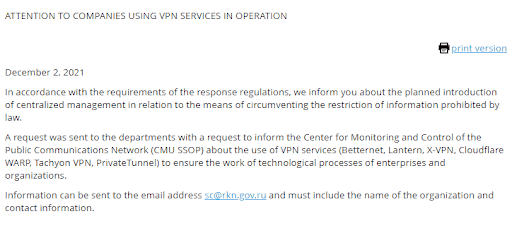
June and September 2021: The First Official VPN Ban
On June 17, 2021, Roskomnadzor issued the first official ban on Opera VPN and VyprVPN. This time around, the regulatory agency was up to its usual trick: banning VPNs under the pretext of curbing extremism and protecting minors.
In this case, Roskomnadzor claimed it acted “per the law on responding to threats to bypass restrictions on access to suicidal, child pornography and other prohibited content.”
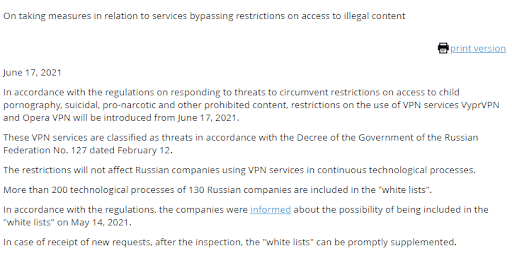
Months later, on September 3, 2021, the Russian authorities were at it again. This time, six VPN vendors were on Roskomnadzor’s bad books and they felt the wrath of the restrictive Russian law. The agency claimed that ExpressVPN, Hola VPN, NordVPN, KeepSolid VPN Unlimited, IPVanish VPN and Speedify VPN aided the access to prohibited information. As a result, the government banned six services.
However, to avert disruption of the operations of registered Russian companies that rely heavily on VPN services, Roskomnadzor issued over 100 IP addresses the companies could use in lieu of a VPN.
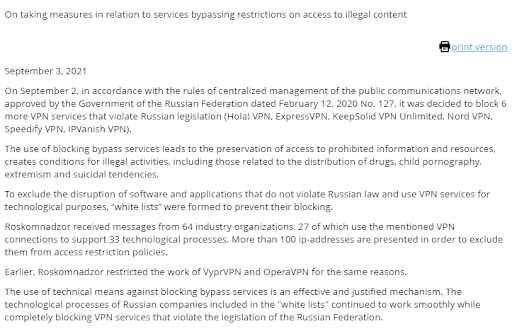
March 2019: Russian VPN Ban Threat
Even though the VPN law came into force in November 2017, the Russian authorities didn’t enforce it until 2019. Even when they decided to put the law into action, they did it with tact.
Rather than an outright ban, Roskomnadzor took a gentle approach to the matter. It began by sending out notifications to 10 leading providers, asking them to connect to the Federal State Information (FSIS) within 30 working days. VPN services that received the notification were:
- ExpressVPN
- NordVPN
- TorGuard
- IPVanish
- OpenVPN
- VyprVPN
- VPN Unlimited
- Hide My Ass
- Hola VPN
- Kaspersky Secure Connection
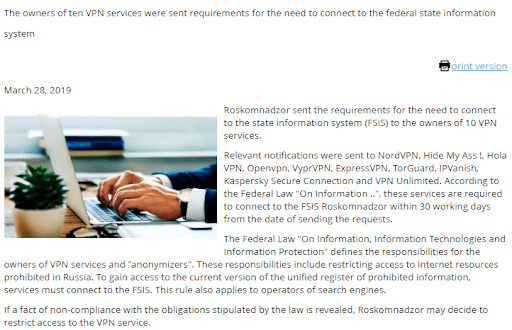
VPN Providers’ Responses
FSIS maintains a regularly updated list of the websites, messaging apps and other digital services Roskomnadzor bans. Connecting to the FSIS would essentially defeat the purpose of using a VPN. As a result, nine of the VPN services stuck to their guns and refused to comply with the Russian government’s demands. Only Kaspersky Secure Connection agreed to connect to FSIS.
The defiant providers reiterated their unwillingness to join hands with Russia in its bid to stifle freedom of speed and access to information. ExpressVPN was one of the providers that refused to play accomplice. As ExpressVPN Vice President Harold Lisays in an email exchange with Cloudwards.net:
As a matter of principle, ExpressVPN will never cooperate with efforts to censor the internet by any country. Protecting privacy and freedom of expression online is part of our core mission, and we will continue to fight to keep users connected to the free and open internet, no matter where they are located.
NordVPN, VyprVPN, OpenVPN, IPVanish, VPN Unlimited and TorGuard went one step further and shut down their servers in Russia. In a blog post, NordVPN said, “connecting to NordVPN servers in Russia may no longer be safe. To prevent any service disruptions or malfunctions, we will be shredding all of our Russian servers and removing them from our service.”
As for the consequences of failing to comply, Roskomnadzor’s letter stated that the agency may decide to ban access to the VPN service in Russia.
The use of the word “may” perhaps shows the government was ready to use amicable means rather than bulldoze the VPNs. In an interview with Interfax in June of 2019, Alexander Zharov — head of Roskomnadzor — stated that the Russian authorities would reach out to the VPN providers to try and find a truce.
Perhaps that’s the reason no VPN ban was recorded in 2020. However, it seems the talks fell through and the Russian authorities resorted to a less talk, more action approach in 2021.
Censorship in Russia
As you can read in our VPN guide, virtual private networks are a great way to stay anonymous online. Instead of connecting to the internet through a server that the government and internet service providers can watch, you connect through a private server, allowing you to do whatever you want online without fear of being tracked (read our VPN security article for the details).
That’s great for torrenting, watching porn or getting past the geoblocks streaming sites have put up, but the tangible way VPNs make the world better is by letting people in countries that censor the internet access the web and say what they want without fear of reprisal, which, in those places, usually comes in the form of a knock at the door and a blindfolded trip to nowhere.
Countries that censor the internet aren’t going to let such a loophole exist if they can help it. China, for example, keeps its Great Firewall big and strong by banning VPNs and punishing people who are caught using one. India required VPN operators to collect user data and Myanmar has enacted a VPN ban.
Russia has a massive list of websites that the government prefers citizens not to visit. If you follow the link above, you can see that a lot of the blocked websites are porn and gambling, but there are plenty of news outlets too. It isn’t just about protecting citizens from bad habits, but also the free flow of information.
We talk more about how the Russian censorship machine works in the Motherland in our best VPN Server for Russia piece, but suffice it to say it isn’t pretty.
Final Thoughts
We don’t have a crystal ball to foretell what the Russian government will do next in a bid to control access to information in the country. However, the above VPN bans are indicative of a regime that’s willing to stop at nothing to ramp up internet censorship in Russia.
We’ll keep an eye out for the latest developments in Russia and report further bans when they happen. In the meantime, we recommend using the best VPN, such as NordVPN, to regain the seemingly elusive internet freedom. Take NordVPN for a test drive with peace of mind, knowing you can request a full refund within 30 days if it doesn’t meet your expectations.
It’s also important to remember that just because a VPN like Hola was once accessible in Russia doesn’t mean it’s a reliable and secure choice. Our Hola VPN review highlights several reasons why you should consider alternative options.
Have you experienced Russia’s internet censorship firsthand? Which VPN service did you use to access banned websites and services? We’d like to hear about it in the comment section. As always, thank you for reading.
FAQ
Yes, but rather indirectly. Despite widespread speculation, the law enacted in 2017 doesn’t directly ban the use of VPNs and anonymizers. Rather, it restricts access to prohibited websites, including those that offer VPNs and anonymizers.
A total of 15 VPNs are banned in Russia. The federal security service is yet to explicitly state the reason behind the ban. As far as we know, the government often claims to ban these services for aiding circumvention of the state-imposed internet restrictions.
Some of the countries that have banned VPNs include Russia, China, Belarus, North Korea, Turkmenistan, Iraq, Oman, Uganda, Turkey and the United Arab Emirates.


